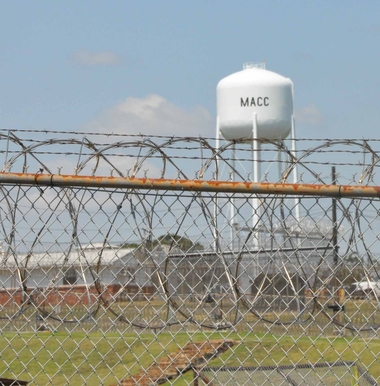Investigative reort: Fallin, staff weaken state programs

(AP) Behind-the-scenes moves by Gov. Mary Fallin’s senior staff members helped lead to a severe weakening of a program designed to cut the state’s high incarceration rates and save taxpayers more than $200 million over a decade, according to interviews and records obtained by Oklahoma Watch.
The efforts by the governor’s staff, assisted by legislative leaders, to take control of the Justice Reinvestment Initiative took place during periods when staff members met with representatives of private prison companies, which stood to gain or lose depending on how the initiative was implemented, emails and logs of visitors to Fallin’s office show.
During that time, private-prison company representatives also made donations to Fallin’s 2014 campaign as well as to legislators, Oklahoma Ethics Commission records indicate.
Steve Mullins, Fallin’s general counsel, said private prison groups and lobbyists played no role in the approach that he and other staff members took.
Mullins also pointed out that the Justice Reinvestment Initiative, or JRI, did not die. Several reforms, such as public-safety grants, received state funding and have been implemented.
But the JRI’s biggest supporters said the program was left in near shambles after the governor’s office delayed carrying it out, reversed itself on seeking a federal grant and orchestrated a move to keep former House Speaker Kris Steele from leading a group overseeing implementation.
Steele said he believes a political desire to appear “tough on crime” and pressure from private prison groups ultimately curbed any serious reform efforts.
Throughout the JRI process, Fallin has expressed support for the program and its goals. The goal of the JRI was to steer nonviolent offenders away from prison, lowering the state’s incarceration rates and costs and using the savings to pay for public-safety efforts.
But the planned funding dropped, sentencing alternatives aren’t being carried out, fewer pardon and parole officers to monitor offenders were added, and crime-reduction strategy training for local law enforcement agencies didn't occur. The initiative also has no official coordinator.
Renewed focus on the JRI comes after Fallin’s office released in late November more than 8,000 documents and emails related to the Justice Reinvestment Initiative. The JRI also continues to draw attention because Oklahoma’s prisons remain overcrowded, with the population rising to more than 26,700 last week.
Among the key actions revealed in the emails and visitor logs of the governor’s office:
· In January, after failing to get Fallin’s preferred candidate named as head of the JRI oversight board, Rebecca Frazier, then Fallin’s assistant general counsel, emailed Mullins pointing out that if the state rejected a federal grant for the JRI, the coordinator job wouldn’t be funded. Mullins affirmed a “new tack” of rejecting federal funds.
· Fallin’s staff played a key role in crafting and pushing legislation that would have done away with the JRI oversight group co-chaired by Steele and Oklahoma County District Attorney David Prater. Steele and Prater resigned from the JRI group in March expressing frustration at Fallin’s office. The legislation ultimately died.
· Facing a deadline for bills getting out of committee, Fallin’s’ Chief of Staff Denise Northrup urgently pressed for a vote on the legislation overhauling the oversight group. The email was sent within a few hours after Mullins met with the president and other representatives of private-prison company Geo Group. Mullins said the reform initiative was not discussed at the meeting.
· Early in the process of carrying out the initiative, Frazier stated in an email that as part of the program, the Department of Corrections planned to transfer prisoners to private prisons owned by Corrections Corporation of America and Geo Group. Justin Jones, former corrections department director, denies ever signing off on such a plan.
· Five days after Steele’s and Prater’s resignations, the political action committee for Corrections Corporation of America made a $4,000 donation to Fallin’s 2014 campaign. A few days later, a lobbyist who represents the company, among other clients, donated $5,000 to Fallin’s campaign. Geo Group had already made donations four days before the session started to 11 legislators.
Nothing in the emails and other records reviewed by Oklahoma Watch states that actions taken by the governor’s staff or legislators were done at the request of private-prison companies. But the documents show private-prison companies communicated with the governor’s office specifically about the Justice Reinvestment Initiative.
Steele said in an interview that the governor’s and attorney general’s offices were not seriously committed to the JRI reforms. Emails show Mullins and Northrup wanted Steele off the JRI group once his term as Speaker of the House ended. He left the House because he was term-limited.
Steele said in an interview that he believed the view of the governor’s staff was “that I would be gone in a year and the issue would go away. I think ultimately, that’s what they were counting on.”
Mullins said instead that in pushing the bill, Fallin’s office wanted to see the group overseeing implementation of the JRI reformed and codified into state law so that it had statutory authority and political muscle to implement change in the system.
“It wasn’t the committee we needed to get the job done,” he said.
Oklahoma Watch is a nonprofit organization that produces in-depth and investigative journalism on important public-policy issues facing the state.
(The full investigative report by Clifton Adcock can be read on the Oklahoma Watch website at http://oklahomawatch.org/2013/12/27/exclusive-the-struggles-over-oklahom... )
by Clifton Adcock, The Norman Transcript.
Copyright 2013 The Associated Press. All rights reserved. This material may not be published, broadcast, rewritten or redistributed.
The Gayly – December 29, 2013 @ 4:30pm





